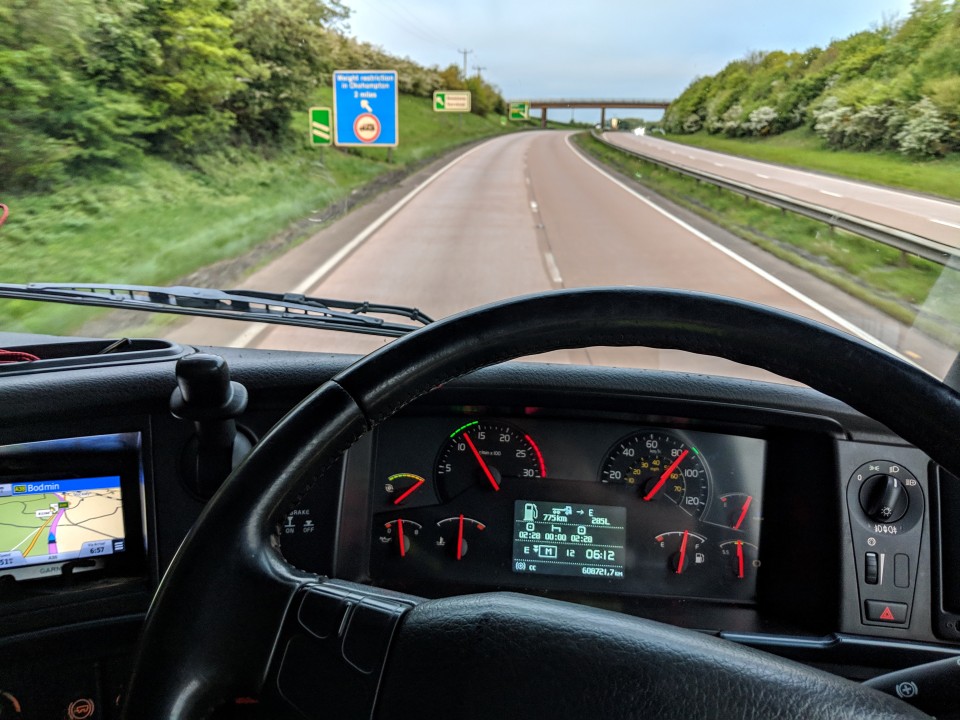
Susie Jones
Unatkozik az úton?
Létrehozva: 27. 08. 2024
•
Frissítve: 27. 08. 2024
Egy átlagos tehergépkocsi-vezető naponta nagyjából 12 órát tölt a volán mögött. A végtelen idő a nyílt úton vonzónak tűnhet, a valóság azonban szöges ellentétben áll ezzel. A számtalan benzinkút, pihenőhely és a hosszú órák unalmassá válhatnak. A kamionosok gyakran töltik a pihenőidejüket otthonuktól távol, és az unalom megelőzése kihívást jelenthet.
A Convoy nemrégiben végzett felmérése szerint az unalom volt a kamionosok egyik legnagyobb kihívása. Milyen hatással van az unalom a járművezetők jólétére? És hogyan tudnak a kamionosok szórakozni?
Hogyan befolyásolja az unalom a járművezető jólétét
A fáradtság, az elszigeteltség, a magány és a mentális stimuláció hiánya a járművezetők gyakori problémái. Egyes járművezetők ezeket az aggodalmakat egészségtelen megküzdési mechanizmusokkal - például túlevéssel, dohányzással vagy túlzott koffeinfogyasztással - kezelik. Idővel ezek a szokások negatívan befolyásolhatják a mentális egészséget.
A mentális egészséggel kapcsolatos beszélgetések javulásával azonban egyre több járművezető választ más utat ennek leküzdésére. A Facebookon megkérdeztük a teherautó-vezetőket, hogy mit tesznek, ha eluralkodik rajtuk az unalom.
"Hangoskönyvek, főleg pszichológia. Zene, beszélgetés a szeretteimmel, vagy rádióhallgatás. Vagy mindent kikapcsolok, és békésen létezem a saját gondolataimmal" - mondja Nigel.
Mások megemlítették, hogy a szeretteikkel való telefonos beszélgetés segített. Ashleigh azt állítja:
"Beszélgetés a barátaimmal egy csoportos chatben. Őszintén szólva, ha nem lennének, már régen abbahagytam volna. Az út feldob néhány szemetet, és az igazán jó barátokkal való beszélgetés nélkül sosem éltem volna túl."
Hasonlóképpen, Karl úgy véli, hogy "a csoportos csevegés a barátokkal elengedhetetlen".

Az unalom megelőzése a volán mögött
A közhiedelemmel ellentétben a tehergépkocsi-vezetés fizikai munka - a sofőröknek koordinációra és koncentrációra van szükségük a balesetek elkerülése érdekében. Ennek ellenére a hosszabb ideig tartó volán mögötti ülés fáradtságot okozhat. Fennáll a veszélye annak, hogy a munka közben elkényelmesedik, különösen akkor, ha a járművezető jól ismeri az útvonalát. Hogyan kezelhetik a járművezetők az önelégültséget a volán mögött?
Akár egy podcastot vagy egy fülbemászó dallamot hallgatnak, a járművezetőknek olyasmit kell választaniuk, ami ébren tartja az elméjüket. Összeállítottunk egy listát azokról a dolgokról, amelyekkel megelőzhető az unalom a volán mögött.
Podcastok: Marty teherautó-sofőr "több tucat podcastot" hallgat vezetés közben. A podcastok kiváló lehetőséget nyújtanak a változatosságra és az új ismeretek elsajátítására. Nézze meg ezt a hasznos kamionos podcastok listája
Zene: "Zene, zene, zene" - ez Richard unaloműzője. Akár rádiót hallgat, akár egy lejátszási listát énekel, a zene kiváló módja annak, hogy ébren tartsa az elmét.
Tartson szünetet: Bár a sofőröknek szigorú határidők és tachográf-szabályok vonatkoznak rájuk, az unalom eltöltésekor a vezetőfülkéből való kiszállás segít az elmének újbóli összpontosításban.
Unalom az állásidő alatt
A kamionosok további kihívásokkal néznek szembe, hogy műszak után szórakoztassák magukat. Az unalom megelőzése érdekében proaktívan kell eljárni ebben az időszakban. Összeállítottunk egy listát az órák eltöltésének módjairól.
Helyszín: Az unalom elűzésére kiválóan alkalmasak azok a kamionmegállók, amelyek széleskörű felszereltséget és közösségi érzést kínálnak. Egyesek társadalmi csomópontként működnek, ahol a kamionosok megoszthatják egymással hasonló tapasztalataikat. Látogasson el a helyszínek oldalunkra, hogy megnézze, milyen létesítményeket kínálnak SNAP szolgáltatási partnereink.
Gyakorlás: A napi séta vagy a kreatív edzés megelőzheti az unalmat, és biztosíthatja, hogy fitt és egészséges maradjon. Nézze meg tippjeinket az egészség megőrzéséhez az úton
Streaming szolgáltatások: Nézze meg a legújabb tévéműsort, vagy görgesse végig a közösségi médiát. Steve teherautó-vezető szeret "görgetni és kommentelni a Facebookon, és Netflixet nézni", hogy elüsse az időt.
Hobbi: A lehetőségek tárháza végtelen. Hangszert tanulni, idegen nyelvet tanulni, rajzolni, írni és még sok minden mást. Egy hobbi felvétele hatékony módja az unalom megelőzésének.
Főzés: Az ételek főzése a fülkében számos előnnyel jár. Nemcsak az unalom elkerülése, hanem pénzmegtakarítás és egészségesebb is.
Maradjon kapcsolatban szeretteivel: A kamionosok pihenőideje tökéletes lehetőséget nyújt arra, hogy kapcsolatba lépjenek a hozzájuk legközelebb állókkal. A videohívások hatékony módja annak, hogy közelebb érezzék magukat a családhoz és a barátokhoz.
Nyugalom: A kamionosok stresszes helyzetekkel szembesülhetnek. A műszak utáni teljes kikapcsolódás javíthatja a járművezető közérzetét. Az olyan relaxációs technikák, mint a mély légzőgyakorlatok és a meditáció csökkentik a stresszt.
Bár néhány járművezető élvezi a nyílt út nyújtotta magányt és függetlenséget, az unalom elleni küzdelem sokak számára még mindig kihívást jelent. A munka jellegéből adódóan a kamionosok gyakran hosszú unalmas időszakokat élnek át. A jólét, a munkával való elégedettség és a közlekedésbiztonság javítása érdekében azonban meg kell találniuk a módját annak enyhítésének. Legyen szó akár a feladatra való összpontosításról, rádióhallgatásról vagy a barátokkal és a családdal való beszélgetésről, a legtöbb kamionos megtalálja a számára megfelelő megoldást.

Hol alszanak a kamionsofőrök?
A legtöbb járművezető a vezetőfülkében alszik, mivel azok jól felszereltek a kényelmes éjszakai alváshoz. Az alapvető hálófülke ágyat, tárolóhelyet, világítást és elektromos csatlakozókat tartalmaz, így az otthontól távol eső otthonná válik.
A jelenlegi európai parkolóhiány miatt sok járművezető a leállósávokban parkol. Ez nem tekinthető biztonságosnak, és a járművezetőt kiszolgáltatottá teszi a lopásnak. 2017 novemberétől az Egyesült Királyságban a nehéz tehergépjárművek vezetőinek heti rendszerességgel pihenőszünetet kell tartaniuk a megfelelő pihenőhelyeken (például a szervizekben és a kamionmegállókban).
A [SNAP Depot Parking] (https://snapacc.com/depot-parking) rendszer lehetővé teszi a flották számára, hogy felajánlják a teherautók parkolóhelyeit a hálózatnak, enyhítve ezzel a hiányt és segítve a járművezetőket a veszélyeztetett helyzetek elkerülésében. Emellett a SNAP több mint 450 szolgáltató partnert biztosít Európa-szerte, ahol a járművezetők parkolhatnak. További információkért látogasson el a térképek oldalunkra.
Miért hagyják nyitva a teherautó-vezetők a pótkocsi ajtaját?
Ha valaha is vezetett már éjszaka egy főúton, észrevehette, hogy teherautók parkolnak nyitott pótkocsiajtókkal. Sok sofőr ezt a tolvajok elriasztására teszi, mivel azt feltételezik, hogy ha a pótkocsi ajtaja nyitva van, akkor nincs mit ellopni. Ezt főként a függönyös pótkocsiknál teszik, mivel ez megakadályozza, hogy a tolvajok a függönyt felhasítva lássák, mi van benne.



